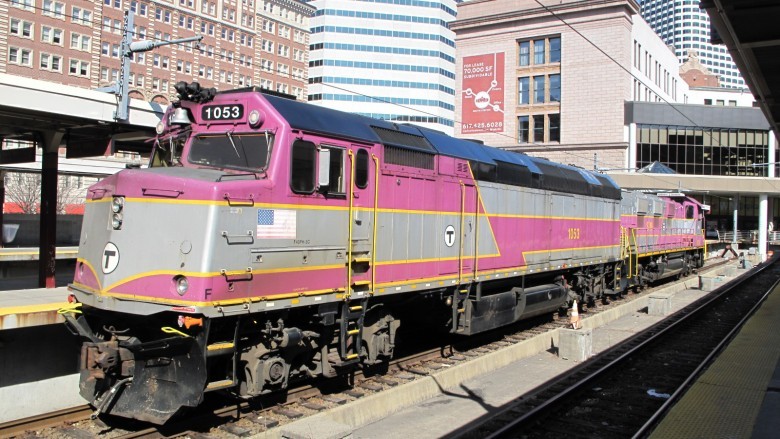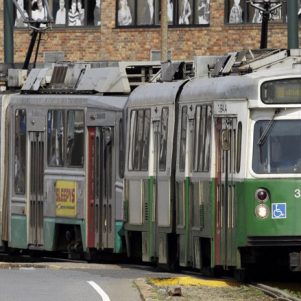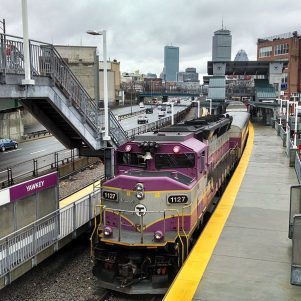Commuter nightmare blamed on Amtrak South Station signal
By State House News Service | February 18, 2016, 12:33 EST
 A commuter rail train passes through Boston on a day when the South Station signals were working. (Photo courtesy of Wikipedia.org)
A commuter rail train passes through Boston on a day when the South Station signals were working. (Photo courtesy of Wikipedia.org) BOSTON – Amidst another day of chaotic commutes for public transit riders, Gov. Charlie Baker on Thursday delivered a forceful defense of proposed MBTA fare hikes as he tried to empathize with the frustration of the riders struggling to navigate through cancelled commuter trains and overcrowded subways.
Amtrak, which operates the rails that serve commuter train lines in and out of Boston’s South Station, early Thursday lost electronic control of signals and switches that let trains enter and exit the transit hub.
Delays and cancellations persisted into the late afternoon and evening as state officials urged riders to use MBTA subways and buses to access inner city destinations or make their way to commuter rail stations away from South Station. Amtrak could not guarantee that the problems would be fixed by Friday morning’s commute, according to state offcials.
“Yeah, I’ve been ready to strangle somebody all day. I’m just waiting for somebody who looks like they deserve to be strangled,” Baker said during an afternoon WGBH radio appearance. “Believe me I feel the frustration that people feel with respect to the way the T was disrupted this morning.”
The congestion caused by commuter rail problems was exacerbated by a disabled Red Line train, another in a string of issues with faulty signals and broken-down trains that has further eroded public confidence in the T.
Asked how he could justify raising fares on riders who frequently find MBTA service unreliable, Baker replied: “That’s exactly why we should.”
MBTA Fiscal and Management Control Board officials are weighing fare hikes of roughly 6 percent to 10 percent.
“You compare this to the New York, Philadelphia, Chicago systems, we will still be far less expensive to the riders than all three of those systems,” Baker said. “We can talk all day about what the right level is with respect to this, but we still are going to be a great deal relative to what people pay to ride other major transit systems in the U.S.”
Baker said the MBTA has suffered from a lack “strategic investment in the core system” for years, but noted how the metropolitan Boston rail system functioned well during the recent cold snap that he said could have been as problematic for an aging transit system as a major snow storm. He called the Amtrak signal problems “just another shot from left field.”
After the morning commute, the T bolstered its off-peak service between the morning and evening rush hours by adding two six-car trains on both the Red and Orange Lines to meet increased rider demand, according to a T spokesman.
After Amtrak notified the state Transportation Department that the South Station signal tower would not be fixed in time for the evening commute, the MBTA rushed to post new schedules for trains that would depart from alternative stations, including JFK/UMass, Back Bay, Forest Hills, Quincy Center and Braintree.
The only trains leaving South Station on Thursday evening were those servicing the Providence/Attleboro and Stoughton lines, forcing potentially thousands of commuters to join T riders on the Red and Orange lines.
Amtrak also informed the state that it was unable to determine whether the switching issues would be resolved by Friday morning’s commute, prompting officials to urge riders to check MBTA.com for schedule updates.
U.S. Rep. James McGovern, a Worcester Democrat who was scheduled to ride the commuter rail from Worcester to South Station on Friday to highlight a permanent increase in the commuter tax benefit for mass transit riders, had to postpone his plan in light of the rail issues.
Baker, during his radio appearance, also defended the MBTA’s impending move to end the after-hours service pilot program in March even as Boston Mayor Marty Walsh has signaled steps he plans to take to bolster the city’s late-night appeal.
Senate President Stanley Rosenberg has also urged caution as the MBTA considers ending the limited service, pointing to the importance of better serving those who work late or overnight shifts and millennials looking for a more vibrant night-life. Late-night service extends the hours of operation on the T by 90 minutes on weekends.
“It has very, very low ridership and it’s hugely expensive to operate,” Baker said. “That model is not the answer to whatever late night service we should provide.”
Baker said he has his own ideas about a new late-night model, but wants to hear other suggestions as well. “We’ll share them with you at some point,” Baker told the Boston Public Radio hosts.
Written by Matt Murphy










